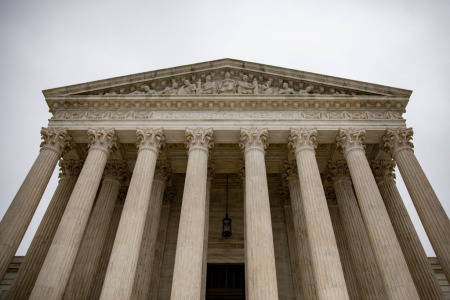Supreme Court rejects Biden's request to revive student loan relief plan

The United States Supreme Court has rejected an emergency request by the Biden administration to revive a plan aimed at relieving federal student loan debt.
In a miscellaneous order released Wednesday in the case of Biden, et al. v. Missouri, et al., the high court declined to vacate a lower court injunction blocking enforcement of the loan relief plan.
“The application to vacate injunction presented to Justice Kavanaugh and by him referred to the Court is denied. The Court expects that the Court of Appeals will render its decision with appropriate dispatch,” read the brief order.
In an additional miscellaneous order issued Wednesday, the Supreme Court declined to vacate a stay in the case of Alaska, et al v. Department of Education, et al. due to the injunction remaining in the case of Biden v. Missouri.
In late June of last year, the Supreme Court ruled 6-3 that a plan by the Biden administration to relieve federal student loan debt violated the Higher Education Relief Opportunities for Students Act of 2003.
"The question here is not whether something should be done; it is who has the authority to do it," wrote Chief Justice John Roberts for the majority, adding that "the Secretary of Education claims the authority, on his own, to release 43 million borrowers from their obligations to repay $430 billion in student loans. The Secretary has never previously claimed powers of this magnitude under the HEROES Act."
"Today, we have concluded that an instrumentality created by Missouri, governed by Missouri, and answerable to Missouri is indeed part of Missouri; that the words 'waive or modify' do not mean 'completely rewrite'; and that our precedent—old and new—requires that Congress speak clearly before a Department Secretary can unilaterally alter large sections of the American economy."
Justice Elena Kagan filed a dissenting opinion to the 2023 ruling, joined by Justices Sonia Sotomayor and Ketanji Brown Jackson, arguing that the states lacked the standing to sue.
"The plaintiffs in this case are six States that have no personal stake in the Secretary’s loan forgiveness plan. They are classic ideological plaintiffs: They think the plan a very bad idea, but they are no worse off because the Secretary differs," wrote Kagan.
"In giving those States a forum—in adjudicating their complaint—the Court forgets its proper role. The Court acts as though it is an arbiter of political and policy disputes, rather than of cases and controversies. And the Court’s role confusion persists when it takes up the merits."
In July of last year, the Biden administration unveiled a new plan, called the Saving on a Valuable Education, which, among other things, capped the amount people had to repay for undergraduate loans at 5% of their incomes, the previous cap being 10%.
As with the initial plan struck down by the Supreme Court, a group of states filed suit against the federal government over the proposal, arguing that the measure violated the spending authority of Congress.
Last month, the U.S. Court of Appeals for the Eighth Circuit granted a stay blocking parts of the SAVE plan, while other portions of the plan had already been blocked by other courts.





















